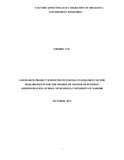| dc.description.abstract | The world has experienced rapid growth in the information and communication technology
(ICT) sector, resulting in major transformation in the social, economic and business operations
and processes. The ICT sector has helped to reduce the cost of communication, increase market
information and facilitate doing business. This has brought the need for government and
businesses to digitize their practices and processes hence the need for data migration. The
purpose of the study was to establish the practices and factors affecting data migration in the
Kenyan Government. The objectives of this study were to: establish the data migration practices
in Kenya Government ministries; and determine the factors affecting data migration in Kenyan
Government ministries. This study used descriptive survey design. In this case the target
population was all ministries. Judgmental sampling was used to select 30 government
departments. The research instrument was a questionnaire which was administered using “drop
and pick later” method. One subject from each department was selected to respond to the
questionnaire. Data was analyzed through percentages, mean scores, standard deviation and
factor analysis. The presentation of findings from quantitative data was by use of tables. Study
finding revealed that data migration in government follow some of the best practices in data
migration. These include quality assurance and quality control of metadata, content preservation
and quality review of the migrated data. Data migration is also challenged by many factors
including financial constraint, inadequate personnel, and poor handling of original documents
and inadequate resources and infrastructure for data migration. To tackle some of these
challenges, government has increased funding to infrastructure and ICT sectors account and also
enforcing standards and guidelines for human resource, infrastructure, processes and system and
technology for the public office and public service. The following recommendations were made.
First, the government departments should ensure that proper planning and budgeting is done
even before the project starts. Secondly, every department engaged in data migration should
ensure a consistent, high level of image quality across collections. Lastly, all data migration
projects in government should follow best practices for data migration. | en_US |

